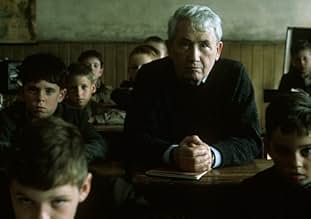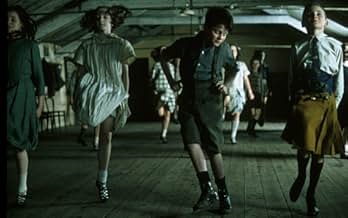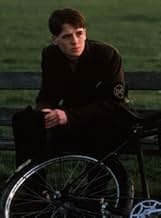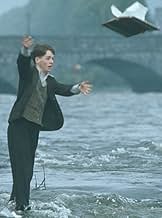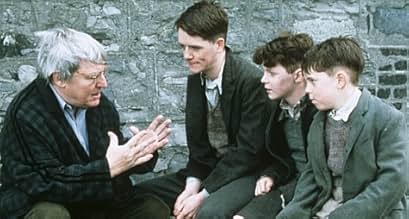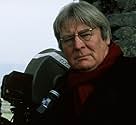An Irish Catholic family returns to 1930s Limerick after a child's death in America. The unemployed I.R.A. veteran father struggles with poverty, prejudice and alcoholism as the family endur... Read allAn Irish Catholic family returns to 1930s Limerick after a child's death in America. The unemployed I.R.A. veteran father struggles with poverty, prejudice and alcoholism as the family endures harsh slum conditions.An Irish Catholic family returns to 1930s Limerick after a child's death in America. The unemployed I.R.A. veteran father struggles with poverty, prejudice and alcoholism as the family endures harsh slum conditions.
- Director
- Writers
- Stars
- Nominated for 1 Oscar
- 5 wins & 12 nominations total
- Narrator
- (voice)
- Young Malachy
- (as Shane Murray Corcoran)
- Director
- Writers
- All cast & crew
- Production, box office & more at IMDbPro
Featured reviews
Yet, the film is also, at times, rich in humor and a sense of that unquenchable optimism that somehow exists in even the most hopeless of circumstances. Frankie, despite the harsh conditions of his life, remains a boy focused on the good things that come his way, enduring even a loving but utterly irresponsible ne'er-do-well father (beautifully played by `The Full Monty's Robert Carlyle) with an indulgence and tolerance borne of filial devotion. As Frankie grows from young boy, dutifully fulfilling the parental role for his younger brothers, to a man verging on the edge of adulthood, he feeds on his dreams of moving to America to start a new life full of hope and promise. The people and situations he encounters on this road create a stunning tapestry of life, teeming with bitterness and coldness it is true, but also with occasional, albeit momentary, displays of warmth, kindness and compassion whether they be from a seemingly bitter aunt who, much to his astonishment, buys Frankie a brand new set of clothes in which to start his new job, a teacher who inspires him to see life beyond the circumscribed limits of this dreary Irish town or a compassionate priest who counsels Frankie in a moment of dark despair. These help to counterbalance the deadening effects of his father's thoughtlessness and drunkenness, the death of his first love by consumption, the often brutal treatment he receives at the hands of both his teachers and fellow classmates. And all the while there stands his mother, the anchor that holds him firmly in place, a woman beaten down by poverty, the untimely deaths of her children, the fecklessness of her otherwise loving husband - yet a woman so full of the quality of stoic self-sacrifice that it is from she that Frankie draws the strength he needs to move on in his life.
Emily Watson provides a luminous portrait of this woman, triumphantly conveying the longsuffering reserve that helps shield her from the ugliness and dreariness of her life and provides her with the strength to carry on and build into her children a sense of moral rectitude. And the three boys who portray Frankie at various stages of the drama are utterly perfect in their wide-eyed naturalism, as they look upon a world often incomprehensible in its drabness and cruelty.
It seems to be becoming a truism lately that, if you want to see the bleakest portrayal of life imaginable, go to see a film set in Ireland. Nowhere does the sun shine less frequently, nowhere do the drab colors of gray and brown so heavily predominate, nowhere does poverty seem so all encompassing and inescapable. The Ireland of `Angela's Ashes' is surely no exception. The filmmakers, moreover, cast a scathing eye on the mindless superstition, bigotry and hypocrisy to be found in much of the blindly pro-Southern Ireland, anti-Protestant, anti-British, anti-Northern Ireland attitude perpetuated by the Catholic Church there in the 1930's. Thus, in the depths of McCourt's autobiographical story, lies a diatribe with its roots planted deep in political and social protest. Yet, because of our fascination with the boy at the center of the narrative, these qualities filter through subtly, never dominating the proceedings. `Angela's Ashes' is rather, from beginning to end, a moving story about goodhearted, ordinary people learning to cope with the immense hardships life throws their way. In the long run, it certainly makes one happier with one's own lot in life. `Angela's Ashes,' for those who can take its uncompromising view of reality, is a richly rewarding experience.
I believe this is the reason this film was such a disappointment to so many viewers who had read the book. Thankfully, I saw the film first, so I had no preconceived notions. With that fresh perspective, I must say that it was outstanding.
It the story is taken from the memoirs of Frank McCourt, who recounted his childhood in Ireland in the 1930's and 1940's. It is a poignant and compelling story of a poor family struggling to survive. The images are powerful depictions of the indignity of indigence in a world where hunger and disease were common and people went almost as frequently to the cemetery as to the market.
Alan Parker brings us a starkly realistic view of McCourt's Ireland. He scoured Ireland to find a ghetto that brought forth the images described in the book, but after an exhaustive search, he decided to build the lane from scratch using McCourt's photographs. Upon visiting the set, McCourt said it was chillingly accurate and he couldn't believe he wasn't back home. Parker desaturated the color to give the film a very stark look, consistent with the squalor he was trying to portray. Paradoxically, the loss of color intensity intensified the power of the images. Though I'm not a big fan of this technique (I like rich and vibrant color), in this case it was the perfect choice.
The film suffers a bit from excessive length, undoubtedly because there was so much to cover. However, when Parker bombards the viewer with disturbingly hopeless imagery for well over two hours, it becomes tedious. This is another advantage of reading a book. You can more easily put it down and come back to it. Parker sometimes overdoes certain ideas that he could have condensed. We could have done without half a dozen vomiting scenes and all the chamber pot activity. One or two such scenes would have gotten the message across.
The cast was consistently excellent. Parker saw over 15,000 child actors before casting the three boys who played Frank at various ages. All three were wonderful, but my favorite was Michael Legge, the oldest Frank. He was the most hopeful person in the film, giving him character and determination, without losing his idealistic innocence.
Emily Watson is a great dramatic actress and rose to the occasion to endow Angela with superhuman strength, courage and persistence in the face of crushing hardship and sorrow. Robert Carlyle was also terrific as Frank's father. He made the character a lovable man with fatal flaws. Despite his heinously irresponsible behavior squandering money on drink as his family starved, his charming nature and effusive affection for the children evoked as much love from us as disgust.
This is a brilliant production. Though many who read the book were disappointed, I must point out that Frank McCourt, who wrote the book, was unabashed in praising it for its realism in capturing his impressions and feelings of the times. I rated it a 9/10. Other than a bit of overkill, this is superb filmmaking giving us an affecting look at the human face of poverty.
of Irish life.
Did you know
- TriviaInterior church scenes were shot in a Dublin studio. Because of its controversial content, the production was denied permission to shoot in any Limerick churches.
- GoofsThe Statue of Liberty has a solid, gold-plated flame, installed in 1984.
- Quotes
Narrator: [First lines] When I look back on my childhood, I wonder how my brothers and I managed to survive at all. It was, of course, a miserable childhood. The happy childhood is hardly worth telling. Worse than the ordinary miserable childhood is the miserable Irish childhood. And worse still is the miserable Irish Catholic childhood.
Details
Box office
- Budget
- $50,000,000 (estimated)
- Gross US & Canada
- $13,042,112
- Opening weekend US & Canada
- $54,628
- Dec 26, 1999
- Gross worldwide
- $13,042,112
- Runtime2 hours 25 minutes
- Color
- Sound mix
- Aspect ratio
- 1.85 : 1
Contribute to this page




